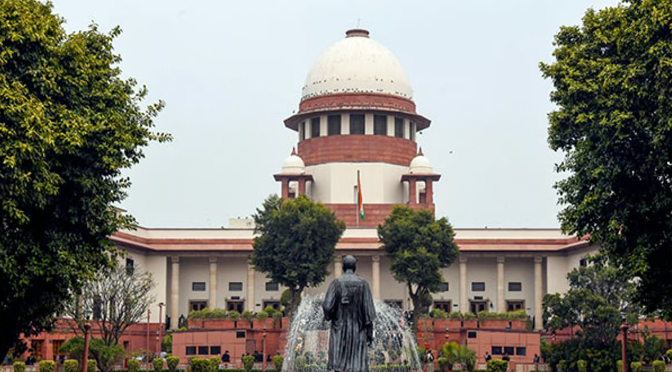Constitution Bench Verdict Binding On Lesser Benches: SC (GS Paper 2, Governance)

Context
- In a landmark ruling, the Supreme Court of India has affirmed the precedence of decisions made by Constitution benches over those made by smaller benches.
- This significant decision came to light during a review of the 2022 ruling concerning land-holding rights under the Haryana Village Common Lands (Regulation) Act, 1961.
April 2022 Supreme Court Verdict
- On April 7, 2022, the Supreme Court issued a verdict regarding the management of land acquired from landowners in Haryana within prescribed limits.
- The ruling clarified that panchayats were not entitled to claim ownership of such lands but were tasked solely with their administration and oversight.
- Notably, the land did not revert to its original owners but was retained for the present and future needs of the community.
Review of the Supreme Court's Decision
- Subsequently, a bench comprising Justices B R Gavai and Sandeep Mehta revisited this verdict.
- They highlighted that the initial decision should have been guided by a precedent established by a Constitution bench ruling in 1966, which it failed to do so.
- Emphasizing the significance of adhering to such precedents, the bench underscored the adverse impact of deviating from established legal standards.
- Consequently, the original April 2022 order was revoked.
Key Legal Principles Reinforced
- This case underscores several crucial legal principles:
1. Binding Precedent: Decisions rendered by Constitution benches are binding on benches with fewer judges, ensuring stability and consistency in legal interpretations across cases and judges.
2. Judicial Review: The review process plays a pivotal role in rectifying errors or significant omissions to ensure fairness and legality in legal determinations, particularly in cases involving potential miscarriages of justice.
3. Legal Consistency: Consistency in court rulings is paramount for fostering trust in the legal system and facilitating predictability of outcomes.
- Upholding the integrity and consistency of the legal system hinges on adhering to well-established legal standards.
More About Haryana Village Common Lands (Regulation) Act
- Enacted in 1961, the Haryana Village Common Lands (Regulation) Act governs the management of Shamlat lands (common lands) in Haryana, India.
- This legislation restricts the buying, selling, or renting out of these lands to prevent fragmentation of holdings, prioritizing agricultural and local community usage.
- Panchayats are empowered to utilize these lands for public welfare purposes.
- Importantly, the Act contains provisions penalizing illegal ownership and usage, with subsequent amendments aimed at bolstering regulations to safeguard against encroachments and illicit acquisitions, reflecting ongoing efforts to safeguard rural community assets.


